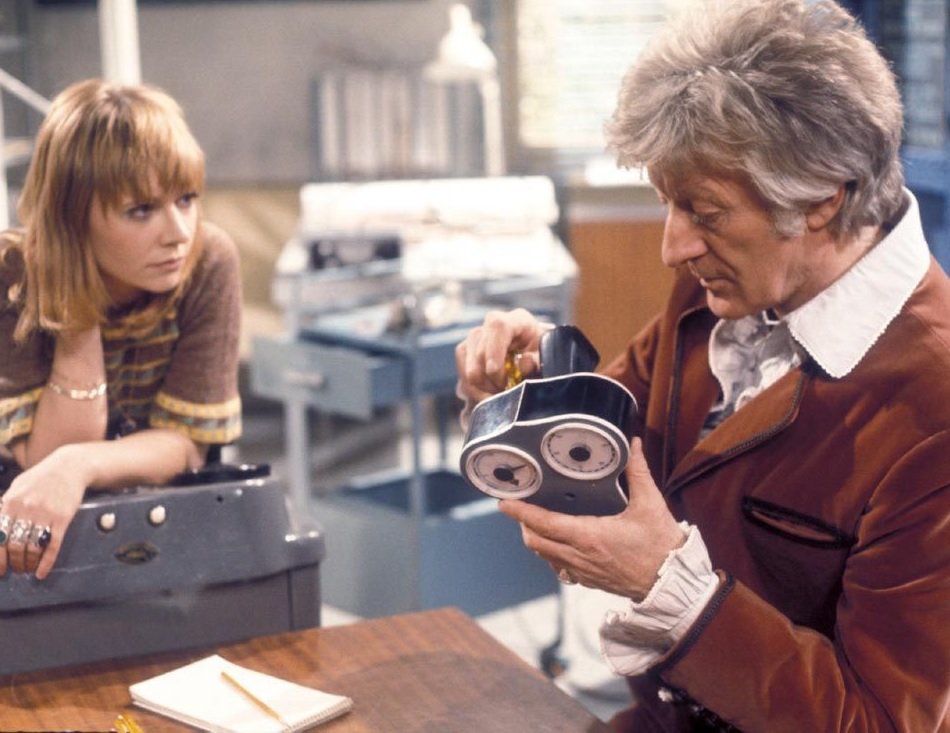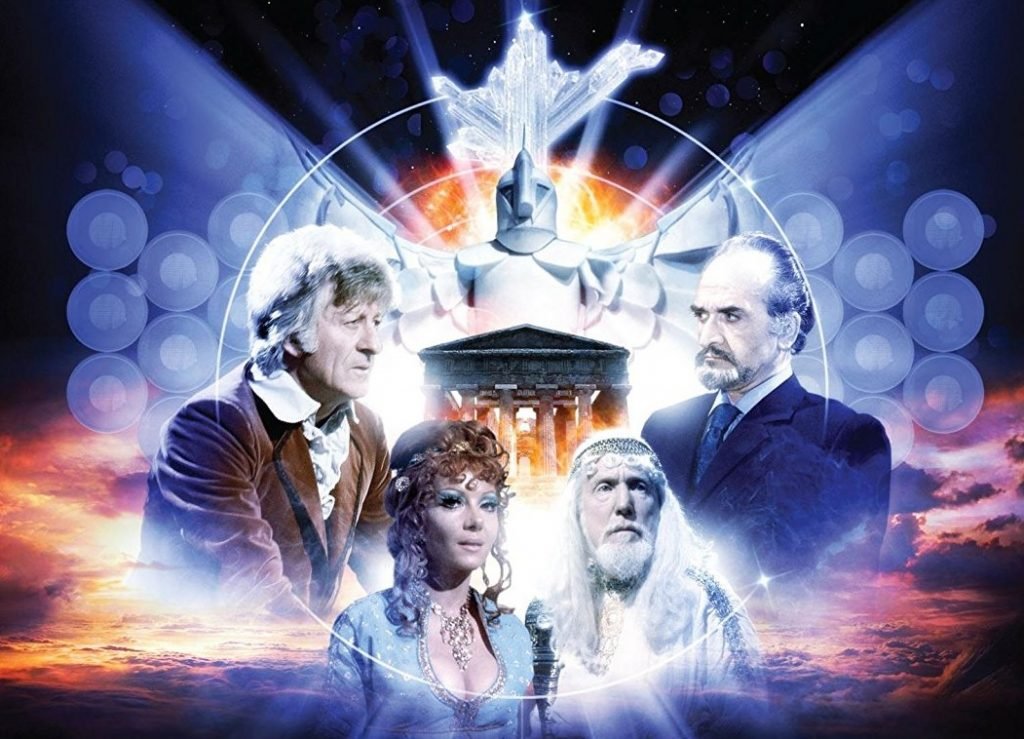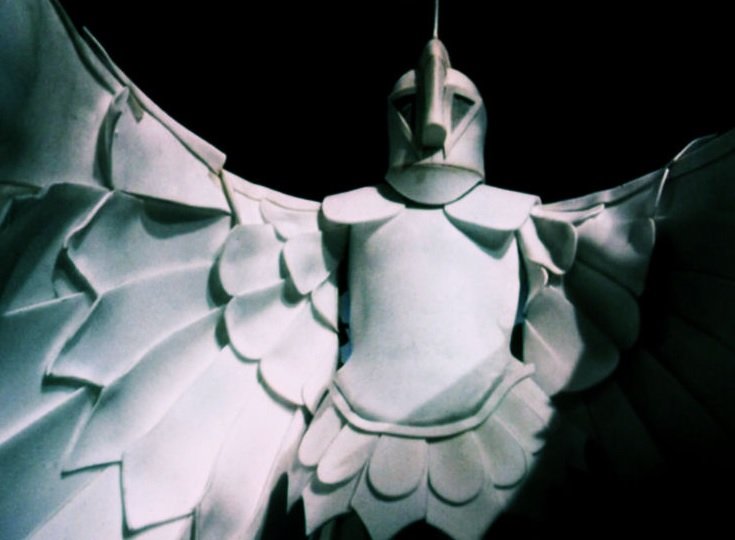The Time Monster finds Jon Pertwee in his third year as the Doctor. Comfortable in the role, he is accompanied by the perky Jo Grant, played by the irrepressible Katy Manning. This being the era of the established UNIT family, the Brigadier (Nicholas Courtney), Captain Mike Yates (Richard Franklin), and ever-faithful Sergeant Benton (John Levene) ably back them up. The story was penned by producer Batty Letts and Robert Sloman, but credited only to Sloman to subvert BBC rules regarding producers writing for their own shows. It was the second of their annual six-part finales, coming after the previous year’s highly regarded tale, The Daemons. Swapping the occult for science, this is the story is of a twisted time experiment and involves another face-off with the recurring Master (Roger Delgado), as well as the fate of the lost city of Atlantis. Again.
The story starts impressively enough with the Doctor waking troubled from a prophetic dream where a giant Master looms over him. He remains far more interested in this than the Brigadier’s imminent visit to The Newton Institute for a new government backed experiment and consequently Sergeant Benton rides along instead.
TOMTIT, or “Transmission Of Matter Through Interstitial Time”, is the subject of the Master’s latest devilish scheme. Playing the role of eccentric foreign scientist Professor Thascalos, complete with hooky Greek accent, he railroads the experiment in an effort to summon up a Chronovore, the Time Monster of the show’s title. Using a crystal of unique properties, he hopes to gain mastery over the creature’s powers as the ancient high priests of Atlantis once did. This all makes for a cracking first episode cliffhanger, where we know the Master is involved but the regulars are still playing catch-up and the Doctor, detecting something amiss, is racing to the scene in Bessie.

With the Master hiding out of sight, the Doctor takes charge as his nemesis begins to an advance his schemes, using time itself as a weapon to keep the UNIT forces and scientists at bay. Eventually, the tale becomes as much about the enmity the Master has for the Doctor as the action moves through a battle of TARDISes to Atlantis itself, where a political power play sees the Master deposing the king in order to pursue his agenda. Though admirable in scope, and with some strong ideas at play, the story is lengthy and some of the production values are not all they could be…
I found the Doctor terribly authoritarian and had forgotten how much of an establishment figure his third incarnation could be. Pertwee is as charismatic and engaging as I remembered and the scene with Jo in the dungeon, where the Doctor relates a story of his youth, is both charming and poignant. He sparkles in those quieter scenes and it’s a lovely counterpoint to the “man of action” antics he is known for. Jo comes across as reasonably meek and obedient, yet they make a great team and have an easy on-screen chemistry. Used, as I am, to feisty companions and a more fallible Doctor, it is a shock to see him played so dominant and frankly sexist. Jo is regularly relegated to looking after people and her questions are answered with a promise of a later explanation, yet Manning does well with what she gets and lights up the screen.
The inherent sexism is doubtless a sign of the times, as well as Manning’s assistant status and her youth, and it roots the show in the era of its production. In this particular story, the writers do endeavour to represent a more liberated female viewpoint though the character of Dr Ruth Ingram, as played by Wanda Moore. Ingram is a professional woman and a card-carrying feminist in a role of relative seniority. She frequently makes reference to her frustration with the male characters and their inability to deal with problems presented. Unfortunately, this is crudely done and she comes across as a bit of a comic turn making exasperated faces at the male “heroes” and become a bit of a bore.

Roger Delgado is superb as the Master. He owns every scene and the show is worth watching for his suave villainy alone. His scenes opposite John Wyse’s Dr Percival in the early episodes are fantastic as he dominates and humiliates the man so effortlessly. For me, some of the best moments are in episode two, as the apparently relaxed and untroubled Master hides out in Percival’s office and the scientist acts as a pseudo-companion for him. His loss at the start of episode 4 is a shame, though he is duly replaced by the stoic Krasis, Donald Eccles. Sadly old Krasis is not half as much fun and spends a good deal of time spouting doom-laden prophecy about Kronos.
Performing as a true equal to the Doctor, we get to see how the Master has the ability to both frustrate him and predict his actions. He enlivens a couple of mad-scientist cliffhangers superbly, as well as a chilling one at the end of episode four when he disposes of the Doctor into the time vortex and leaves Jo stranded – all done with a devilish smile.
The Brigadier has some fun here too, getting one over on the politicians, and you can see the sparkle in Nicholas Courtney’s eye as he delivers those lines. His role leans more towards comedy in this story, as he berates Yates for drinking on the job and accuses the others of having a picnic when they’re debating their next move (he is not wrong though, as they do stop and make marmalade sandwiches!). It is a shame he does not believe Yates when the convoy first comes under attack though, as you’d think by now he would be a little more accepting of the insanity that follows the Doctor around.
Though the UNIT regulars’ roles remain limited to the present day, Sergeant Benton gets plenty to do, as he is effectively paired up with the two scientists for the latter episodes. It is great to see him pull a gun on the Master, though he is easily outwitted before being then accidentally reduced in age to a baby. It is also Benton who appears to grasp the principles of interstitial time. I wonder if he is doing a Buddhist course at night school, as it certainly reveals the Sergeant’s hidden depths. Captain Yates, on the other hand, gets short shrift as he is left to man the phones, is then attacked and finally bombed, before being sent home. All in a day’s work as the Brigadier’s right hand man, I would imagine.

Ian Collier gives us both the young and old Stuart Hyde, an unfortunate victim of the time experiments. I was very impressed with his aged makeup and his performance too, as his student character seemed very real and grounded. The interplay with both Wanda Moore and John Levene was excellent and he appeared to be making something of the material, presented as he was as a “fully paid up, card carrying coward”. Collier, of course, would return to the show in Season 20’s Arc of Infinity as the renegade Time Lord Omega, albeit fully costumed, and again in Big Finish’s Omega.
Atlantis is another world, in terms of both storytelling and casting. George Cormack is impressive as the positively ancient King Dalios and it was amusing to see the Master failing in his attempt to bewitch the old man. He plays well with Pertwee and I almost wish there had been more to this area of the story and Dalios’ role. Sadly, I cannot say the same of Ingrid Pitt’s Galliea. Between her ample cleavage, strong accent, and unsubtle lustings for both power and the Master himself, it was all a bit distracting. Apparently she’d also made promises to Hippias (Aidan Murphy) who was the secret crush of Lakis, played by a young Susan Penhaligon. Jo does her best to enter into the spirit of things, getting decked out in a little local colour and sporting a very impressive wig.
When it finally came to the Minotaur, the creature was somewhat of a bit-part. Reasonably well realised, using the impressive stature of future Darth Vader actor Dave Prowse (although he apparently can’t remember filming it at all), the dashing Doctor deals with him in short order using his red-lined jacket, matador style. In many ways, it is a shame more was not made of the creature, but there really wasn’t time. Still, he was not Doctor Who’s first Minotaur: that credit goes to The Mind Robber – and not the last either with the same Greek mythology inspiring both The Horns of Nimon and The God Complex.

It was a lovely concept to have the Master throwing people from other times at the UNIT convoy to slow its progress, such as the jousting knight and the Roundheads. He had obviously done his homework as he brought forward the ‘doodlebug’ bomber when they were in exactly the right location. There is a throwaway line to that effect from the farmer, although if the bomber and its bomb had been extracted from the war, how would he have known about it? A little paradox there perhaps, though perhaps explained away with “time being in flux” or some such. Either way, it was a great fun to see the Master sporting a chunky CSO-powered video watch showing scenes from WWII in black and white. I want one!
Frankly, I found is risible that the Brigadier and Benton did not instantly recognise the Master immediately, despite his cod accent and radiation suit. He’s meant to be their number one wanted person and is an escaped prisoner to boot! That said, it would not have made for much of a story, so perhaps I ought to let that one go. On a more important note, given that the Master has a fully working TARDIS, I am not quite sure why he doesn’t head straight to Atlantis at the time of Kronos and simply take control of the monster there. It seems odd that he feels the need to summon it to the present day and go though all the bother, plus the disguise and risk attracting UNIT’s attention at all.
Kronos, the monster itself, is initially great, built up over the first two episodes as the terrifying force that the Master intends to dominate. Feared and long anticipated, the creature is firstly caught in glimpses of over saturated white and shot rapidly by director, Paul Bernard, making great use of tube camera flare for a simple visual effect. Sadly, the costume is an utter disappointment when you get a fuller view, simply looking for all the world like what it is – a masked man in a white chicken suit. The wire-work does not impress either, so it is a shame we ever get that proper view and the ‘less is more’ approach was not held to.

In the final stages of episode six, we see an alternate version of Kronos, when the two TARDISes are taken out of time. Here, the Chronovore is presented as a giant face plastered across the groovy CSO backdrop, and played as an all-knowing chaotic God of time who lets the Time Lords go on a whim. Though actress Ingrid Bower does her best to be charismatic, it’s all just a little too odd.
There are some interesting moments of ‘playing with time’ across the first three episodes, where the Doctor remains unaffected whilst his friends are subject to the influence of TOMTIT’s backwash (who sniggered?!). Also, Bessie seems to have an unusual high-speed facility and it is fun to see the Doctor making use of his superior Gallifreyan reflexes, in both driving and walking through the distorted time fields. It put me very much in mind of the Ninth Doctor as he steps though the fans in The End of the World, going beyond what any human could do. Of course, some of the playing with time verges more towards temporal gobbledygook, with TARDISes materialised inside each other (not the last time that’d happen), but this is all done for great visual effect. One does wonder why it is quite so easy for Jo to trigger a ‘time ram’ from the console of the Master’s TARDIS, but to pick on that too much would be churlish because it is the self-sacrificing action of the character that is important, with her showing that she has the courage to do what she knows the Doctor will not.
The story was released on DVD as part of the Myths and Legends box set, backed with a documentary feature and an excellent commentary moderated by Toby Hadoke which chops and changes voices across the six parts featuring Barry Letts with Marion McDougal (production assistant) and, on episode five, actress Susan Penhaligon (Lakis). Two episodes are given over to the entertaining and fond reminiscences of John Levene, while episode five features thoughts from a panel of fan writers who both celebrate the tale and attempt to rationalise its shortcomings. As ever, the info text option provides a wealth of trivia for the more ardent fan. These make this a great purchase, even if the serial itself is never going to be remembered with the same fondness Spearhead from Space, The Curse of Peladon, or Carnival of Monsters attracts.

In truth, six episodes is probably a couple too many for The Time Monster. The pacing seems off, weighted too much in favour of the time experiments and then suffering a rushed crack at Atlantean politics in the final two. Perhaps it required compressing into four episodes, or expanding into a pair of linked four-parters – probably the former. As it is, the tale sags around the middle and feels a little padded, with episode three, in particular, feeling like it is all talk and no action. A good example of this is the Doctor’s scratched-up device to frustrate the Master’s experiment. It is great fun, but ultimately pointless and does not advance the story at all. There is a strong idea at play here though and it is good for the show to be having a crack at the concept of time itself, rather than it purely being the vehicle used to bring the Doctor to the story.
Visually, I think the real let downs are the realisation of Kronos creature itself and then the markedly static resolution; Pertwee, Delgado, and the guest cast do some fine work with most of the material. The introduction of Buddhist concepts are interesting, drawing on the personal passions of writer and producer Barry Letts. Of course these themes will return again, most notably in Pertwee’s final outing, Planet of the Spiders.
This is one of those occasions where I feel the storyline would have better suited a tighter slot, with fewer strands and the loss of a few characters to boot. All in all, it was a touch too ambitious, but still well worth seeking out.
Privacy Overview
This website uses cookies so that we can provide you with the best user experience possible. Cookie information is stored in your browser and performs functions such as recognising you when you return to our website and helping our team to understand which sections of the website you find most interesting and useful.
Strictly Necessary Cookies
Strictly Necessary Cookie should be enabled at all times so that we can save your preferences for cookie settings.
If you disable this cookie, we will not be able to save your preferences. This means that every time you visit this website you will need to enable or disable cookies again.
